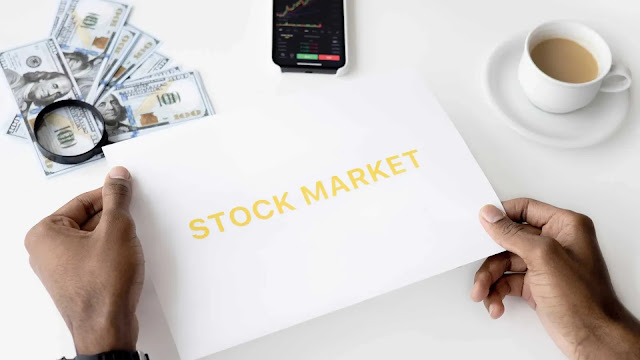Exploring Direct Stock Trading Opportunities for Indians in the US
The idea of Indians investing in the US stock market is gaining attention. More and more Indians are getting curious about investing their money in stocks from the United States. This is because they believe that investing in international markets, like the US, might bring them good returns on their investments.
Indian investors are becoming increasingly interested in exploring opportunities beyond their own country's stock market. They're attracted to the potential for higher profits and the chance to diversify their investment portfolios by investing in companies from different parts of the world.
 |
| Exploring Direct Stock Trading Opportunities for Indians in the US |
In the past, if Indians wanted to invest in US stocks, they typically did so through mutual funds or exchange-traded funds (ETFs). Mutual funds pool money from many investors to buy a collection of stocks, making it easier for individuals to invest in a diverse range of companies. ETFs are similar, but they are traded on stock exchanges just like individual stocks. Both options help spread risk and make it simpler for Indians to invest in US stocks without directly buying individual company shares.
Rise of Direct Stock Trading
In recent times, a new trend is taking shape among Indian investors - direct stock trading in the US market. This means that instead of relying solely on traditional methods like mutual funds and ETFs, Indians are now directly buying and selling stocks of US companies. Let's delve into why this trend is gaining momentum. Also Read - How Trading Can Shape Your Life's Trajectory?
 |
| Direct Stock Trading |
A. Increased Accessibility
Direct stock trading has become possible due to increased accessibility. Online platforms and brokerage firms have made it much easier for Indians to open accounts and trade stocks in international markets. Unlike before, when only big investors could access foreign markets, now even small investors can take part.
B. Advancements in Technology
Technology has played a big role in this shift. With the rise of smartphones and high-speed internet, people can trade stocks from the comfort of their homes. Mobile apps provide a user-friendly interface, allowing investors to monitor their investments and make quick decisions on the go.
C. Ease of Information Dissemination
In today's digital age, information travels fast. Indian investors can easily access news, analysis, and insights about US companies. This access to information helps them make informed decisions about which stocks to buy or sell. Social media, financial news websites, and investment forums contribute to this knowledge-sharing process.
D. Factors Driving the Trend
The trend of direct stock trading is being driven by a combination of factors. First, investors are seeking higher returns and are drawn to the potentially lucrative US market. Second, they want to diversify their portfolios beyond the Indian market. Third, the COVID-19 pandemic has highlighted the need to be flexible with investments, and global stocks provide that diversification.
Advantages of Direct Stock Trading
Direct stock trading offers several benefits that appeal to investors seeking greater control over their investments and the potential for higher returns. Also Read - The Power of a Personalized Trading Strategy.
 |
| Advantages of Direct Stock Trading |
A. Potential for Higher Returns
Investing directly in individual stocks can lead to higher returns as compared to traditional investment methods like mutual funds or ETFs. If the companies you choose perform well, the value of your investments can grow significantly.
B. Greater Control over Investment Choices
Direct stock trading gives you the power to make your own investment decisions. You can select the specific companies you want to invest in, based on your research and beliefs. This control allows you to tailor your portfolio according to your preferences.
C. Ability to Build a Diversified Portfolio
Creating a diversified portfolio is crucial for managing risk. With direct stock trading, you can handpick stocks from various industries, spreading your investments and reducing the impact of poor performance in any one sector.
D. Access to Investment Information
Engaging in direct stock trading provides you with access to a wealth of investment information. You can analyze company financials, industry trends, and market news to make informed choices about your investments.
E. Potential for Learning and Growth
Direct stock trading can be a valuable learning experience. It encourages you to understand market dynamics, stay updated on global economic trends, and improve your financial decision-making skills.
Challenges and Considerations
Indians exploring direct stock trading in the US market encounter various challenges that require careful consideration before diving in. Also Read - Why Trading is Often Harder Than It Seems?
 |
| Challenges and Considerations |
A. Regulatory Requirements
Direct stock trading in foreign markets comes with regulatory complexities. Indians need to adhere to the rules and regulations of both their home country and the US. These regulations might involve specific account requirements, documentation, and compliance with securities laws.
B. Tax Implications
Tax implications are a significant consideration. Indians trading US stocks need to understand the tax treaties between the two countries, as well as the implications of capital gains and dividend taxes. Failing to navigate these tax obligations properly could lead to unexpected financial burdens.
C. Currency Exchange Risks
Currency exchange rates can impact your investments. The value of the US dollar in comparison to the Indian rupee can influence your returns. Fluctuations in exchange rates can affect the value of your investments, adding an additional layer of risk to consider.
D. Market Volatility
US stock markets can be highly volatile. Prices of individual stocks can change rapidly due to a variety of factors. This volatility can lead to substantial gains, but it also poses risks, especially for inexperienced traders.
E. Thorough Research and Understanding
Navigating these challenges requires thorough research and a deep understanding of market dynamics. Indians interested in direct stock trading should educate themselves about the US market, company performances, and global economic trends. Building this knowledge base is essential for making informed decisions and managing risks effectively.
F. Professional Guidance
Given the complexities involved, seeking professional guidance from financial advisors, tax experts, and legal consultants is advisable. They can help navigate the intricacies of regulations, taxes, and risks, ensuring that your investment journey is well-informed and compliant.
Getting Started
For Indians looking to embark on the journey of direct stock trading in the US market, here's a comprehensive guide to help you navigate the process. Also Read - The Path to Financial Freedom: Diversification, Income Streams, and Wealth Generation.
 |
| Getting Started |
Step 1: Research and Choose a Brokerage Account
Explore different brokerage options that facilitate international trading for Indian investors. Global brokerage accounts, like those offered by Interactive Brokers, TD Ameritrade, Charles Schwab, and Fidelity, allow direct trading in US stocks. Alternatively, some Indian brokerage firms have tie-ups with international counterparts that grant access to global markets, including the US.
Step 2: Evaluate Account Requirements and Fees
Compare account requirements, fees, trading platforms, and customer support offered by different brokerage firms. Look for an option that aligns with your investment goals and preferences.
Step 3: Open a Brokerage Account
To open an overseas trading account with a domestic Indian broker, provide necessary documentation, including identification and address proof. If opting for a foreign broker, be prepared for additional paperwork and verification. Follow the broker's instructions for account opening.
Step 4: Fund Your Account
Deposit funds into your brokerage account. Different brokers offer various funding methods, such as bank transfers or online payment gateways. Ensure you understand the funding process and any associated fees.
Step 5: Explore the Trading Platform
Once your account is funded, explore the trading platform provided by your chosen broker. Familiarize yourself with its features, tools, and resources for researching and trading US stocks.
Step 6: Start Trading
Begin your direct stock trading journey by researching US stocks. Leverage the research tools and platforms provided by your broker. Consider factors like company fundamentals, market trends, and expert opinions before making investment decisions.
Additional Considerations
- Depositary Receipts (DRs): Consider investing in Depositary Receipts (ADRs or GDRs), which allow indirect access to US stocks.
- Risk Management: Diversify your investments to manage risks and balance your portfolio's performance.
Navigating Regulatory and Tax Hurdles
Indian investors delving into direct stock trading in international markets, particularly the US, encounter a maze of regulatory and tax challenges that necessitate careful understanding and navigation. Also Read - Trading Algorithms and AI: Partnering or Replacing Human Traders?
 |
| Navigating Regulatory and Tax Hurdles |
A. Regulatory Landscape and Compliance
Investors need to be well-versed in the regulatory landscape of both their home country and the foreign market they're trading in. This includes understanding account opening requirements, documentation procedures, and compliance with local and international securities laws. Failing to comply with these regulations could lead to legal issues and financial penalties.
B. Foreign Account Tax Compliance Act (FATCA)
The Foreign Account Tax Compliance Act (FATCA) is of particular importance. It's a US law that requires foreign financial institutions to report financial accounts held by US taxpayers to the Internal Revenue Service (IRS). For Indian investors, this means that if they hold financial assets in the US, they need to ensure proper tax reporting to avoid penalties. FATCA compliance is essential to prevent legal complications.
C. Seeking Professional Guidance
Navigating the regulatory and tax complexities requires expert guidance. Consulting with financial advisors, tax professionals, and legal experts who specialize in international investments can be immensely beneficial. These professionals can help investors understand the nuances of compliance, tax obligations, and reporting requirements, ensuring that they stay on the right side of the law.
D. Staying Updated
Regulations and tax laws can change over time. Therefore, it's important for Indian investors to stay updated on any changes that might impact their investments. This can involve following updates from regulatory bodies, financial news, and seeking advice from professionals.
Currency Exchange Considerations
When venturing into international investing, such as direct stock trading in foreign markets like the US, understanding currency exchange rates becomes vital due to its substantial impact on investment outcomes. Also Read - The Million-Dollar Question: Can Trading Lead to Wealth?
 |
| Currency Exchange Considerations |
A. Significance of Currency Exchange Rates
Currency exchange rates determine the value of one country's currency in relation to another's. For investors, this means that the value of their investments can be influenced not only by the performance of the stocks but also by fluctuations in exchange rates. Changes in exchange rates can amplify or diminish investment returns.
B. Currency Conversion Options
Investors have various options for currency conversion. Some brokerage platforms offer currency conversion services, allowing you to convert your home currency to the foreign currency needed for trading. Additionally, you can use specialized currency exchange services or maintain foreign currency accounts.
C. Potential Costs
Currency conversion comes with costs, often in the form of conversion fees or less favorable exchange rates offered by financial institutions. These costs can eat into your investment returns over time. It's crucial to compare different conversion options and choose the one that offers the best balance between cost and convenience.
D. Strategies to Mitigate Currency Risks
To mitigate the risks associated with currency fluctuations, investors can consider a few strategies. One approach is currency hedging, where financial instruments are used to reduce the impact of exchange rate movements. Another strategy is to diversify your investments across multiple currencies, reducing the impact of a single currency's fluctuations.
E. Stay Informed and Plan Ahead
Currency exchange rates can be unpredictable. Investors must stay informed about global economic factors that could influence exchange rates. Moreover, planning ahead and considering potential currency movements can help investors make more informed decisions.
Research and Investment Strategies
When it comes to international investing, particularly in direct stock trading, conducting thorough research and employing effective investment strategies are key factors for successful outcomes. Also Read - Trading vs Investing - Which Strategy to Choose for Better Results?
 |
| Research and Investment Strategies |
A. Importance of Research and Due Diligence
Research is the foundation of informed investment decisions. Before investing in any company's stock, it's crucial to understand its market trends, financial health, competitive position, and growth potential. Conducting due diligence minimizes the risks of making hasty decisions based on emotions or incomplete information.
B. Understanding Market Trends and Indicators
Understanding market trends and economic indicators helps investors anticipate potential shifts in the market. Factors like interest rates, inflation rates, and geopolitical events can impact stock prices. Staying informed about these trends allows investors to adjust their strategies accordingly.
C. Exploring Company Fundamentals
Company fundamentals include aspects like revenue, earnings, debt levels, and management quality. These factors provide insights into a company's overall health and potential for growth. By analyzing these fundamentals, investors can make more informed decisions about which companies to invest in.
D. Basic Investment Strategies
Long-Term Investing: Long-term investing involves holding onto stocks for an extended period, allowing them to potentially grow in value over time. This strategy takes advantage of compound interest and minimizes the impact of short-term market fluctuations.
- Diversification: Diversifying your portfolio by investing in stocks from various sectors and industries helps spread risk. Poor performance in one sector won't have as significant an impact on your overall portfolio if it's well-diversified.
- Dollar-Cost Averaging: This strategy involves investing a fixed amount of money at regular intervals, regardless of market conditions. It helps reduce the impact of market volatility by buying more shares when prices are low and fewer when prices are high.
E. Seeking Professional Advice
For investors new to international trading or those seeking expert insights, consulting with financial advisors or investment professionals can provide valuable guidance. These experts can help tailor strategies to individual financial goals and risk tolerance.
Tools and Resources
For Indian investors delving into the world of US stock trading, a range of online resources and tools are available to aid in research and analysis. These tools can help investors make informed decisions and stay updated on market trends. Also Read - How Trading Sets Itself Apart from Gambling?
 |
| Tools and Resources |
A. Financial News Platforms
Financial news platforms like Bloomberg, CNBC, and Reuters offer real-time updates on stock market developments, economic indicators, and company news. These platforms provide valuable insights that can help investors understand the factors influencing stock prices.
B. Stock Analysis Websites
Stock analysis websites like Yahoo Finance, Google Finance, and Seeking Alpha provide comprehensive information about individual companies. Investors can access financial statements, performance metrics, analyst ratings, and expert opinions, allowing for thorough research before making investment choices.
C. Investment Apps
Investment apps such as Robinhood, E*TRADE, and TD Ameritrade offer user-friendly interfaces for trading and tracking stocks. These apps often provide research tools, market data, and customizable watchlists, making it convenient for investors to manage their portfolios on the go.
D. Market Research Tools
Some platforms offer advanced research tools that allow investors to screen stocks based on specific criteria. These tools can help investors identify potential investment opportunities that align with their investment goals and preferences.
E. Educational Resources
Many brokerage platforms and financial websites also offer educational resources such as articles, videos, and webinars. These resources can help investors understand complex financial concepts, investment strategies, and market dynamics.
F. Social Media and Forums
Social media platforms like Twitter and investment forums like Reddit's WallStreetBets can provide insights and discussions about market trends and individual stocks. However, it's important to critically evaluate information from these sources and cross-reference with reputable sources.
Risk Management
In the world of investing, managing risks is crucial for safeguarding your financial future. Understanding the importance of risk management and adopting a prudent approach can lead to more balanced and successful investment outcomes. Also Read - Innovators, Risk-takers, Leaders: Understanding Entrepreneurs.
 |
| Risk Management |
A. Importance of Managing Risks
Investing always carries a level of risk. Markets can be unpredictable, influenced by factors ranging from economic trends to geopolitical events. Acknowledging and managing these risks is essential to protect your investments and minimize potential losses.
B. Setting Realistic Expectations
It's important to set realistic expectations about your investment returns. While everyone hopes for substantial gains, the reality is that markets can be volatile and outcomes can vary. Having realistic expectations helps you stay patient during market fluctuations and avoid making impulsive decisions based on emotions.
C. Diversification
One of the key principles of risk management is diversification. This means spreading your investments across different assets, industries, and regions. By not putting all your eggs in one basket, you can reduce the impact of poor performance in a single investment on your overall portfolio.
D. Diversified Investment Approach
A diversified investment approach involves investing in a mix of assets such as stocks, bonds, real estate, and other financial instruments. This approach helps you balance risk and potential returns. If one type of asset underperforms, others may perform well, providing stability to your portfolio.
E. Professional Guidance
Seeking advice from financial advisors or investment professionals can help you create a well-structured investment strategy that aligns with your risk tolerance and financial goals. Professionals can offer insights into suitable asset allocations and risk management techniques.
Conclusion
Embarking on the journey of direct stock trading in the US market offers Indian investors a world of opportunities and challenges. As interest in international investments grows, it's essential to equip oneself with knowledge and strategies to navigate this dynamic landscape.
From understanding the significance of research and risk management to exploring diverse investment strategies, the path to success involves informed decision-making. Researching market trends, delving into company fundamentals, and staying informed about economic indicators are crucial steps that lay the foundation for well-informed investments.
 |
| Conclusion |
Additionally, recognizing the importance of risk management and diversification cannot be overstated. Managing risks, setting realistic expectations, and building a balanced portfolio help safeguard investments against market volatility and unexpected downturns.
Opening a brokerage account, whether through global brokerage firms, Indian brokers with international ties, or depositary receipts, is the gateway to international trading. By choosing the right brokerage account type, understanding account requirements, and exploring funding options, investors can kickstart their direct stock trading journey with confidence.
As with any financial endeavor, seeking professional guidance when needed and staying up-to-date with the ever-changing landscape of international investing is essential. Direct stock trading can be rewarding, but it demands a blend of research, strategy, and diligence to make the most of this opportunity.
In conclusion, Indian investors exploring the US stock market can seize the potential for growth by leveraging tools, research, and diverse strategies while keeping risk management at the forefront. By combining informed decision-making with prudent risk management, investors can embark on a path toward achieving their financial aspirations in the global market.
